Porridge, Hunger, and the Fragile Thread of Learning

Jean Baptiste Kamate, Chief Field Operations Officer at World Vision, reflects on an ongoing challenge: despite repeated pledges from governments and global institutions, children’s right to be heard is often overlooked. Across the world, millions of children face hunger daily. But their stories are rarely told in their own words. In Malawi, Bertha is five years old. She doesn’t speak in policy terms or metrics. She speaks in porridge.
15 September 2025.
“If we stop getting porridge, we will start skipping school and losing focus in class.”
Simple, warm and sustaining, this humble meal is the difference between learning and dropping out. It is a thread connecting child’s future and child’s present.
Across 13 countries, over 1,000 children told us what school meals mean to them. They are a reason to show up in class. And by showing up, they get a chance to thrive.
Davila, 14, Brazil: “We want to be heard on school meals, because we know what we need. It’s about our health and education.”
Hunger, displacement, school violence, mental health struggles are not abstract issues. Children understand their lived realities better than any adult ever could, because we’ve forgotten how to speak in porridge, a simple language that makes no excuses for hunger.

Are Policymakers Really Listening?
Despite repeated pledges from governments, donors, and global institutions to prioritise children’s rights, one of the most fundamental, the right to be heard is routinely overlooked. Token gestures are mistaken for empowerment. Policies, programmes, and interventions continue to be designed for children, not with them.
Child-led research remains one of the most underfunded and undervalued rights in the UN Convention on the Rights of the Child (UNCRC). It is treated as symbolic rather than substantive, a systemic failure disguised as progress. And yet, when children are genuinely involved, policies become more relevant, interventions more precise, and outcomes more sustainable.
“Children know their own experiences better than any adult. Ignoring them is not just unfair, it’s inefficient.”
When children select topics, gather data, and formulate recommendations, they produce evidence that is more contextual, credible, and often brutally honest.
School Meals in Our Words: Choosing Our Future
Our recent research, brought together over 1,000 children from 13 countries to share how school meals affect not only hunger, but learning, confidence, and overall well-being. Their insights reveal important connections between nutrition, safety, quality, and children’s ability to thrive at school.
As Bertha says, for her porridge equals learning.
Children’s voices are not only powerful they are practical, offering insights that policymakers cannot afford to ignore.
As we approach the 2025 Global School Meals Summit in Brazil, the evidence collected will directly influence global advocacy and resource mobilisation, ensuring policies reflect the realities children face every day. This is a vivid demonstration of the transformative power of child-led research: when children are genuinely engaged, programmes become more effective, policies fairer, and interventions more impactful.
World Vision’s approach is clear: listening to children is not a courtesy or a checkbox. It is a strategic, evidence-based, and transformative imperative.
Integrating child-led research into humanitarian and development programme cycles and national strategies ensures decisions are informed by those who live the harsh realities, not assumptions. Investing in adult capacity-building is essential so adults facilitate rather than control participation.
And robust advocacy with governments, donors, and multilateral actors is non-negotiable to make policies genuinely child-informed.

Shift the Power
As a father of two, I wonder when we lost the ability to speak in porridge and whether we can relearn to speak in simple terms once again. The first step is, perhaps, listening.
Policymakers, donors, media outlets, global actors: if you are not embedding space, structure, and funding for child-led research, you are speaking about children without listening to them.
This is not sentimental rhetoric. It is a systemic imperative. Change happens when we move from speaking on behalf of children to speaking with them. Centre their voices in policy, programming, and advocacy and watch real impact follow.
Because if we continue making decisions for children without them, we are not just failing them we are jeopardising the very future we claim to protect.
Bertha told us what she needs, so I ask you policymakers, donors, media, global actors:
Will you commit to learning porridge once again?
Jean Baptiste Kamate is an international development executive and humanitarian expert, overseeing World Vision’s operations in 83 countries. He has led operations across West and East Africa, including country programmes in Mali, the Democratic Republic of Congo, and Rwanda. He holds a PhD from Regent University in Virginia Beach, USA.